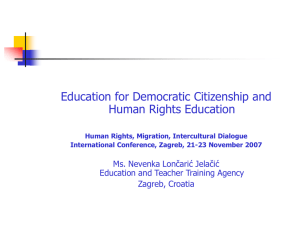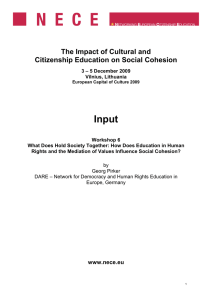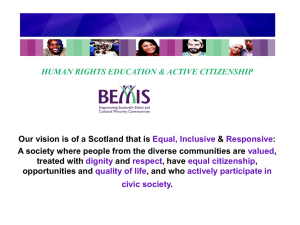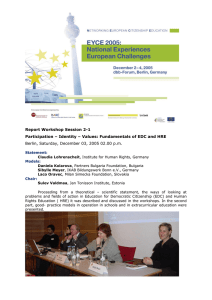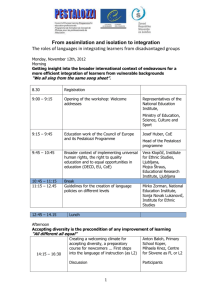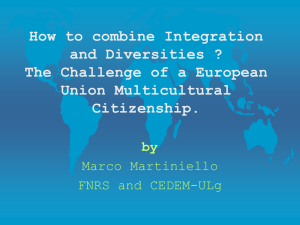working title
advertisement
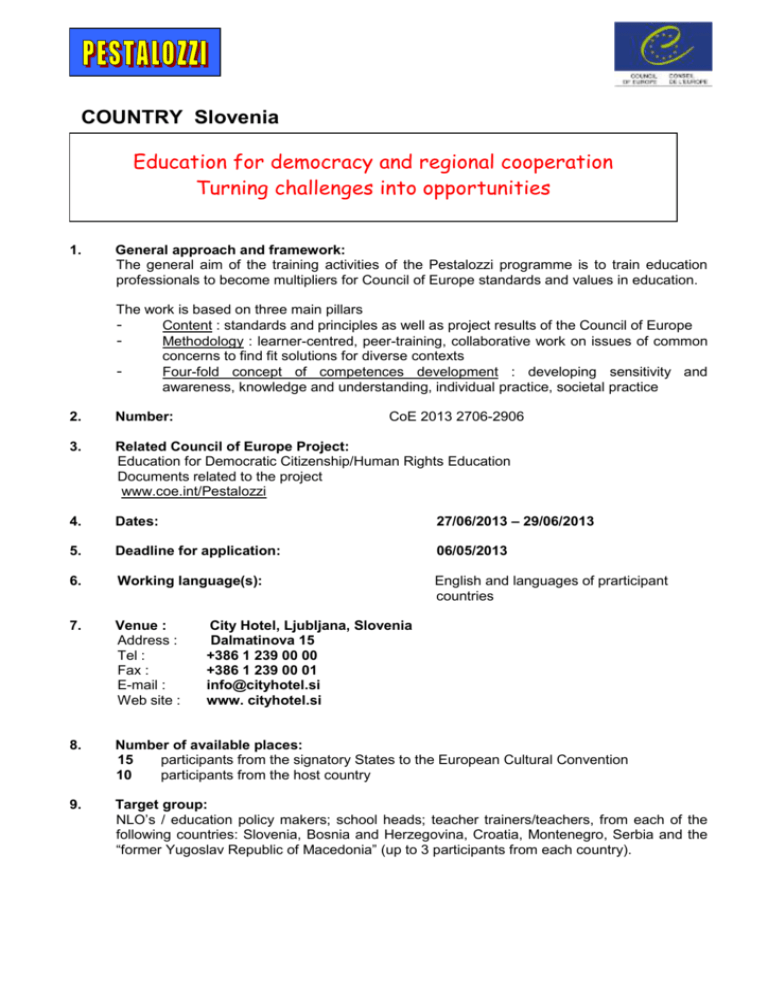
COUNTRY Slovenia Education for democracy and regional cooperation Turning challenges into opportunities 1. General approach and framework: The general aim of the training activities of the Pestalozzi programme is to train education professionals to become multipliers for Council of Europe standards and values in education. The work is based on three main pillars Content : standards and principles as well as project results of the Council of Europe Methodology : learner-centred, peer-training, collaborative work on issues of common ( concerns to find fit solutions for diverse contexts Four-fold concept of competences development : developing sensitivity w and awareness, knowledge and understanding, individual practice, societal practice 2. Number: 3. Related Council of Europe Project: Education for Democratic Citizenship/Human Rights Education Documents related to the project www.coe.int/Pestalozzi 4. Dates: 27/06/2013 – 29/06/2013 5. Deadline for application: 06/05/2013 6. Working language(s): English and languages of prarticipant countries 7. Venue : Address : Tel : Fax : E-mail : Web site : 8. Number of available places: 15 participants from the signatory States to the European Cultural Convention 10 participants from the host country 9. CoE 2013 2706-2906 City Hotel, Ljubljana, Slovenia Dalmatinova 15 +386 1 239 00 00 +386 1 239 00 01 info@cityhotel.si www. cityhotel.si o r k i n g t i t l e ) ( w Target group: NLO’s / education policy makers; school heads; teacher trainers/teachers, from each of othe following countries: Slovenia, Bosnia and Herzegovina, Croatia, Montenegro, Serbia and the r “former Yugoslav Republic of Macedonia” (up to 3 participants from each country). k i n g 10. Focus of the training activity: Ever since its founding, the Council of Europe has steadily supported activities and initiatives aimed at the dissemination of its basic principles, standards and values including human rights, democracy and the rule of law. In particular, over the last two decades considerable attention has been given also to the development of training schemes as well as teaching and learning materials. Yet, as the authors of the All-European Study on Education for Democratic Citizenship published by the Council of Europe have found out, there is a ‘compliance gap’ between political statements, policy intentions and implementation measures hampering seriously the area of education for democratic citizenship. Overcoming these and other challenges has become one of the priorities supported by the CoE, including the Pestalozzi Programme, the EDC project as well as other project initiatives and dissemination activities. This training activity undertaken as part of the Pestalozzi Programme directs to unravel the interconnection between the theory, policy and practice in the area of education for democratic citizenship and human rights education in western Balkan states. The workshop will explore which particular aspects of education for democracy the training cooperation and networking should focus on. This will be done by defining similarities and differences as well as specific issues of each region. It will also explore the strengths and opportunities offered by such a form of regional cooperation as well as the concrete form the cooperation and networking could take. The aim is twofold, on the one hand, building on existing activities and initiatives undertaken by the Council of Europe together with national authorities from participating countries, it aims to present the most important teaching and learning materials in the area of education for democratic citizenship and human rights education. On the other hand, it aims to offer ample room for both the participants and the speakers to discuss in detail the challenges and opportunities teaching and learning materials play in the implementation of the basic concepts and core competences associated with education for democratic citizenship in the non-ideal circumstances of everyday pedagogical practice. 11. Expected results: This training activity will explore various aspects the cooperation and networking in the area of teaching and learning materials on education for democratic citizenship and human rights education leave largely unexamined. In particular, the similarities and differences between different CoE member states in this area of scholarly research as well as the challenges and opportunities faced by different stakeholders will be explored. At the same time, this training activity aims to identify the priorities and topics of common interest among the participants of this seminar as well as envisage a set of follow-up activities and initiatives aimed to strengthen the teaching and learning of basic concepts and core competences associated with education for democratic citizenship. Moreover, this training initiative aims to explore the various opportunities this form of cooperation and networking offers to various stakeholders in the region as well as to offer a model of cooperation and networking in the area of education for democratic citizenship for other CoE members states/regions. The overall aim of this European workshop is therefore to further strengthen the regional cooperation and networking in the training of education professionals over the basic principles, standards and values of the Council of Europe in the field of education with a particular emphasis on the pedagogy promoted and modelled by the Pestalozzi Programme. Furthermore, this training activity is intended to start an on-going process with subsequent European Workshops proposed and hosted by the other participating Western Balkan countries on an annual basis. 2 12. Outline of programme : Day 1 of the seminar will be devoted to the presentation of the main trends and challenges on EDC and HRE as stemming from the ICCS survey and other studies.1 Particular attention will be given to the presentation of the data on the values and principles promoted by the Council of Europe (democracy, human rights and the rule of law). At the same time, participants will present the challenges and opportunities their countries are experiencing in the area of EDC and HRE. Day 1: Day 2: Teaching and learning on EDC and HRE: trends and challenges Morning Education for Democratic Citizenship and Human Rights Education: a cross-country perspective Education for Democratic Citizenship and Human Rights Education: trends and challenges The role of the Council of Europe in EDC and HRE policies Afternoon visit of the Slovene School Museum (guided tour of the museum together with a lecture education for democratic citizenship from a historical perspective) Teaching and learning on EDC and HRE: from theory to practice and back Based on the information and experiences provided during Day 1 of the seminar, Day 2 will be devoted to the examination of various curriculum-based and practice-oriented initiatives on EDC and HRE whose impact has proven to be both efficient and sustainable. Morning EDC and HRE: curriculum and materials lecture and workshop Afternoon EDC and HRE: curriculum and materials experiences exchange Day 3 (half day): Basic concepts and core competencies: from theory to practice and back Day 3 will primarily aim at the summing up of the information and experiences provided during this training activity. Morning 13. EDC and HRE: the way ahead Organizing body: Name & e-mail : 1 Zavod RS za šolstvo, Poljanska 28, 1000 Ljubljana, Slovenia Web site: www.zrss.si Directors Mrs Brigita Žarkovič Adlešič, Dr Mitja Sardoč e-mail: brigita.zarkovic-adlesic@zrss.si e-mail: mitja.sardoc@guest.arnes.si The European Report of the ICCS survey carried out by the IEA is available at the following website : http://www.iea.nl/fileadmin/user_upload/Publications/Electronic_versions/ICCS_2009_European_Report.pdf 3 14. Coordinator of the training : Name & Address : Mrs Veronika Pirnat Tel : +386 1 3005 154 Fax : + 386 1 3005 199 E-mail : veronika.pirnat@zrss.si, 15. Travel and subsistence expenses: Travel expenses : Travel expenses of participants from the signatory States are covered by the Council of Europe according to the rules. Subsistence expenses : Subsistence expenses – accommodation and meals – are covered by the host country for all participants. Any travel or activity, included in the programme of the European Workshop, should also be taken in charge by the host country. 16. Other information: The success of the training activities depend on the commitment of all the participants. By accepting to participate in the Pestalozzi programme, participants and facilitators agree to participate actively and assiduously in all the phases of the activity. Information for participants from the signatory States to the European Cultural Convention : Travel expenses : Participants benefiting from reimbursement of their travel expenses are advised to consult carefully on the website the section about “Rules”. Application form: Candidates must send their application form duly completed to the National Liaison Officer of their country of residence. All information available on : http://www.coe/Pestalozzi 4
